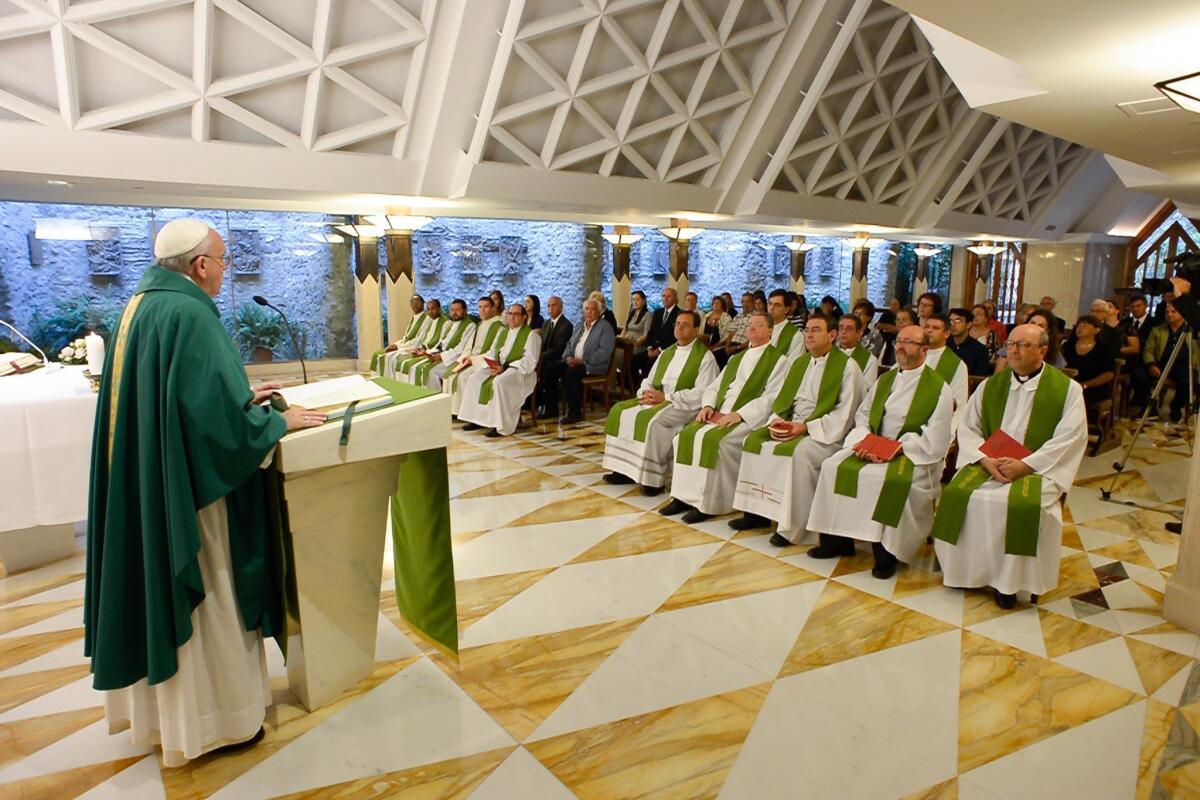Pope’s decree on abortion may signal change in tone, not practice

Pope Francis celebrates Mass at the Vatican on Sept. 1.
- Share via
Reporting from Catania, Italy — In a further sign of his emphasis on mercy, Pope Francis declared Tuesday that all priests, during a special holy year starting in December, will have the authority to pardon women who have had abortions, a power usually reserved for bishops.
The move came three weeks before the pontiff’s scheduled visit to the United States, where abortion remains a hot-button social and political issue.
The new directive may not change much in practical terms in the U.S., where, according to one analyst, most bishops have already delegated the power to absolve for abortion to the rank-and-file priests below them. But Francis’ announcement accords with his bid to make the Roman Catholic Church a more accessible vehicle of tenderness and grace.
In a letter, the pontiff wrote that he had decided, “notwithstanding anything to the contrary, to concede to all priests for the Jubilee Year the discretion to absolve of the sin of abortion those who have procured it and who, with contrite heart, seek forgiveness for it.”
The Jubilee Year, which starts in December, is traditionally a period during which Catholics can seek redemption from their sins by visiting St. Peter’s Basilica in Rome. Such holy years are normally celebrated every quarter of a century, but popes are allowed to call special ones. The last was in 2000, during John Paul II’s reign.
Francis did not deviate from church teaching that abortion is a serious sin with grave consequences, including, potentially, excommunication.
“The tragedy of abortion is experienced by some with a superficial awareness, as if not realizing the extreme harm that such an act entails,” he wrote.
But of women who have had abortions, he said: “I am well aware of the pressure that has led them to this decision. I know that it is an existential and moral ordeal. I have met so many women who bear in their heart the scar of this agonizing and painful decision.”
The shift in tone comports with previous statements that Francis, the first pope from South America, has made on gays and lesbians and on divorcees who remarry. While many have welcomed his approach, it rankles some conservative Catholics, including fiercely antiabortion bishops in the U.S., who believe their leader is soft-pedaling sin.
Father Thomas Rosica, a Vatican spokesman, rejected criticism that the pontiff was downplaying the issue.
“Forgiveness of the sin of abortion does not condone abortion nor minimize its grave effects,” Rosica said. “The newness is clearly Pope Francis’ pastoral approach.”
Robert Gahl, a professor at the Pontifical University of the Holy Cross in Rome, agreed that the pope’s move did not represent a move away from traditional church teaching and practice. John Paul II also put out a teaching during his papacy about the mercy that repentant women who have had abortions could expect from God.
“He didn’t abolish the crime, and he didn’t change anything about church teaching. But he’s made it easier for not just the women but for anyone who’s directly involved in effecting the abortion that the priest can release them from the penalty of that crime,” Gahl said.
Most bishops in the U.S. have already devolved the authority to forgive the sin of abortion to the clergy below them, Gahl said.
“It’s not even a big shift in terms of pastoral practice,” he said. “But it’s a very powerful sign of welcoming [people] back to the sacraments.”
A hint of the pope’s announcement Tuesday came back in May, when Archbishop Rino Fisichella, the president of the Pontifical Council for the New Evangelization, said that a group of priests would fan out across the world during the holy year to absolve certain serious sins, including abortion.
Francis’ letter, which was addressed to Fisichella, went further by authorizing “all priests” to grant the pardon for abortion.
Abortion remains a controversial topic for Catholics in various countries around the world, not just the U.S. In Brazil, Catholic officials outraged many in 2009 when they refused permission to a 9-year-old girl to abort her pregnancy, even though she had been raped by her stepfather and doctors feared she would die during childbirth.
Ireland, which recently approved same-sex marriage in a national referendum, still adopts a restrictive approach toward abortion.
The Jubilee Year begins on Dec. 8 and ends Nov. 20, 2016. Francis took many by surprise by launching a special holy year off the usual schedule, with mercy as its guiding theme.
In the papal bull last March announcing the Jubilee Year, Pope Francis said the time would be “dedicated to living out in our daily lives the mercy” that God “constantly extends to all of us.”
“Mercy is the very foundation of the church’s life,” Francis said. “The church’s very credibility is seen in how she shows merciful and compassionate love.”
During the year, bricked-up “holy doors” in Rome’s four basilicas, including St Peter’s, are opened, granting pilgrims a special route to salvation, before they are closed once again at the end of the Jubilee Year.
Special correspondent Kington reported from Catania and Times staff writer Chu from London.
Follow @HenryHChu on Twitter for coverage of Europe
More to Read
Sign up for Essential California
The most important California stories and recommendations in your inbox every morning.
You may occasionally receive promotional content from the Los Angeles Times.











